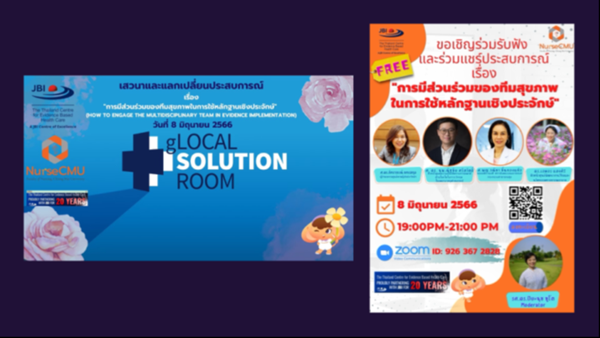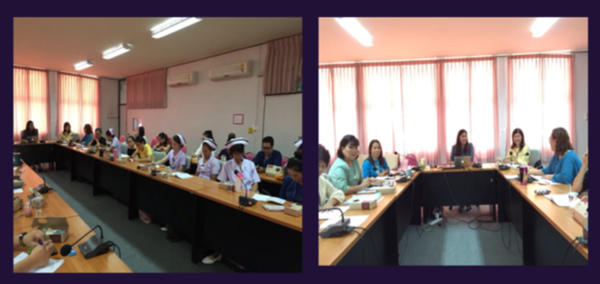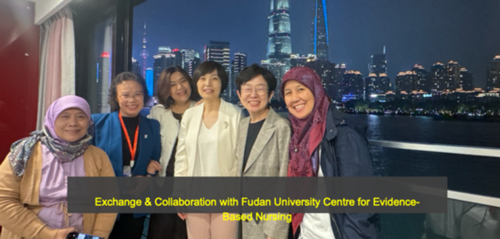Collaborative knowledge communication: From evidence to trust
Author: Professor Patraporn Bhatarasakoon
The JBI Thailand Centre for Evidence-Based Health Care
Faculty of Nursing, Chiang Mai University
Introduction
On this year’s World Evidence-Based Healthcare Day, we are reminded that evidence has power only when it is shared, understood and trusted. Evidence, regardless of its rigour, cannot influence practice or policy unless it is communicated and applied in ways that resonate with stakeholders. The principle of ‘what works for whom’ reflects a pragmatic orientation towards evidence use, and underpins the work of organisations dedicated to bridging the evidence–practice gap. JBI, for example, has embedded this principle in its evidence implementation framework, which emphasises context-specific, stakeholder-engaged and pragmatic strategies to ensure that evidence is meaningful, feasible and sustainable in practice settings. This blog explores potential ways of enhancing collaborative knowledge-sharing, providing key take-home messages.
The problem
Collaborative knowledge communication is hindered by interrelated organisational, technological and human factors. At the organisational level, knowledge transfer between experts and clinicians is often disrupted by expert-related, clinician-related, reciprocal, situational and systemic barriers. In geographically dispersed teams, failures to share contextual information, uneven information distribution and misinterpretation of silence create persistent ‘mutual knowledge’ problems. In digital environments, communication is further weakened by content clutter, lack of interpersonal cues and fragmented sequencing.
Key obstacles include information silos resulting from poor tool integration, knowledge asymmetry between specialists and decision-makers, and human factors such as trust and motivation, which technology alone cannot resolve. Cross-cultural collaborations add further complexity, as tacit and socially embedded knowledge differs across organisational models. In practice, cross-cultural collaboration needs to emphasise the diverse backgrounds of each organisation.

Our experience: Building bridges through action
Since its establishment, the JBI Thailand Centre for Evidence-Based Health Care has sought to move beyond simply transferring knowledge, instead cultivating a culture of collaborative learning and shared ownership of evidence. Some of our key strategies include:
1. Investing in capacity-building
We have trained nurses and healthcare providers across the country through numerous initiatives that combine structure, mentorship and practical relevance.
Systematic review training: Conducted three times annually, this program develops foundational skills for evaluating and synthesising the evidence before transferring it into clinical settings.
Webinars on clinicians’ pain points: We host regular online seminars on the practical challenges faced by healthcare providers, such as how to appraise evidence before using it in clinical practice and how to transform clinical problems into structured research questions. Although these topics may appear simple, they often represent major barriers for busy practitioners.
Mentoring and peer support through the SR Incubator: This workshop-based, online mentoring program helps young researchers produce systematic reviews ready for publication in high-impact journals.
Research residency practice: A unique experiential learning model where young researchers apply their evidence-based practice (EBP) knowledge in real-world clinical settings, supported through collaborative supervision and on-the-job learning.
Through these activities, participants not only gain technical competence but also develop the confidence to integrate evidence into daily decision-making.

2. Developing clinical champions
We bring evidence-based training directly into hospitals through on-site mentorship in systematic review methodology and guideline development, writing and publication. These clinical champions act as local catalysts for change, bridging academia and practice while modeling evidence-informed decision-making.
3. Fostering academic–clinical partnerships
Collaborations between academics and clinicians are partnerships for innovation. Through joint projects, shared guideline development and storytelling of successful implementation, both groups co-create solutions that are relevant, feasible and culturally sensitive.

4. Engaging global and cross-cultural networks
The JBI Thailand Centre actively collaborates with national and international partners. Storytelling between centres has proven especially powerful. Sharing lessons learned, contextual challenges and creative strategies enrich mutual understanding and strengthen global evidence networks.

Key take-home messages
Evidence-based healthcare cannot thrive without trust, and trust cannot be rebuilt without open, inclusive and shared explicit, implicit and tacit knowledge through formal and informal channels.
On this World Evidence-Based Healthcare Day, we must commit to working together across disciplines, sectors and communities to ensure that evidence not only exists, but also lives, speaks and makes a difference.
References
Eppler, M.J. (2004). Knowledge Communication Problems between Experts and Managers An Analysis of Knowledge Transfer in Decision Processes.
Cramton, C.D. (2001). The Mutual Knowledge Problem and Its Consequences for Dispersed Collaboration. Organiz Sci, 12, 346-371.
Buder, J. (2007). Net-Based Knowledge Communication in Groups. J Psychol, 215, 209-217.
Hussin, A.R., Alsayed, M.H., & Dahlan, H.M. (2012). Knowledge Sharing in Collaborative Research Activities.
Eppler, M.J. (2011). Knowledge Communication. Encyclopedia of Knowledge Management.
Cormican, K., & Dooley, L. (2007). Knowledge Sharing in a Collaborative Networked Environment. J Inf Knowl Manag, 6, 105-114.
Lam, A. (1997). Embedded Firms, Embedded Knowledge: Problems of Collaboration and Knowledge Transfer in Global Cooperative Ventures. Organiz Stud, 18, 973 - 996.
Porritt, K; McArthur, A; Lockwood, C; Munn, Z (2023). JBI's approach to evidence implementation: a 7-phase process model to support and guide getting evidence into practice. JBI Evidence Implementation 21(1):p 3-13.
World Evidence-Based Healthcare Day. (2025). World Evidence-Based Healthcare Day campaign statement: Evidence and trust. Retrieved September 27, 2025. Available from: https://worldebhcday.org
To link to this article - DOI: https://doi.org/10.70253/LSOI8433
Disclaimer
The views expressed in this World EBHC Day Blog, as well as any errors or omissions, are the sole responsibility of the author and do not represent the views of the World EBHC Day Steering Committee, Official Partners or Sponsors; nor does it imply endorsement by the aforementioned parties.
